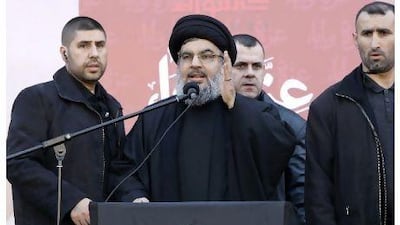BEIRUT // The black-turbanned leader of Hizbollah, Hassan Nasrallah, made a rare open-air appearance in Beirut yesterday, saying his militant Shiite group was gaining weapons, strength and members by the day.
His brief appearance at a rally in a Shiite neighbourhood to mark the holy day of Ashura was seen by analysts as a show of strength in light of the chaos gripping Hizbollah's main sponsor, Syria, and a gesture to rally the morale of the group's membership.
"Day after day our numbers are increasing and our training, our confidence and strength are increasing," Mr Nasrallah said. "Our weapons are not rotting. We are always renewing and getting more."
It was Mr Nasrallah's first appearance at a public gathering since 2008. He has rarely been seen in public since Hizbollah battled Israel in a month-long war in 2006, fearing Israeli assassination.
Since then, he has communicated with his followers and gives news conferences mostly via satellite video link.
"I have chosen to be among you today for a few minutes ... so the whole world can hear and we can renew our pledge," he said, briefly addressing the crowds from a podium before moving to an disclosed location to deliver the main part of his televised speech.
Hizbollah's weapons are a contentious issue in Lebanon. The group insists it needs to maintain its powerful arsenal to ward off any threat from Israel but the weapons also make it the most potent military force in Lebanon — far stronger than even the national army.
Talal Atrissi, a political commentator and professor at Lebanese University, said Mr Nasrallah's appearance would boost the morale of Hizbollah supporters.
"Today there are lots of opinions and rumours that Hizbollah is weaker than before, because of what happened in Syria," he said. "I suppose that Nasrallah wanted to show the opposite and insisted on the position that Hizbollah is well organised and armed."
Analysts said Hizbollah, whose popularity extends beyond Lebanon's Shiite minority, has been tarnished by its association with Syria and the crackdown on the nine-month uprising against president Bashar Al Assad in which more than 4,000 people have been killed.
Mr Nasrallah yesterday reiterated his support for the Al Assad government, calling for reforms but stating that the target of the revolt in Syria was the "regime of resistance", one that is anti-Israel
"We say yes to addressing all of the reasons behind problems in Syria and yes to reforms which the Syrian leadership agreed to," he said.
"But there are those who don't want peace or dialogue in Syria, who want to compensate for their defeat in Iraq, who want to make up for their potential strategic losses in Egypt by changing the situation in Syria," he said in an apparent reference to the United States.
But it was Mr Nasrallah's singling out of the Syrian opposition that was one of the most compelling aspects of his speech, said Amal Saad-Ghorayeb, a Lebanese writer known for her work on Hizbollah.
"Since [the revolt began in] March, he hasn't criticised the opposition per se. Today this was really quite radical in that he singled out [Burhan] Ghalioun [head of the Syrian National Council] by name," she said.
Mr Nasrallah blasted the US administration and said what he called the "American-Israeli project" was the greatest threat to the region.
He also alluded to the recent unravelling of a CIA network in Lebanon.
"The US intelligence became spies for the sake of defending Israel," he said. "We have spying networks we are uncovering, as well as continuous Israeli violations.
"We stress that the formula - army, people and resistance - is the advantage we have to defend Lebanon."
Tens of thousands flooded the streets of south Beirut yesterday to mark Ashura, one of the most important dates on the Shiite religious calendar commemorating the 7th century death of Imam Hussein, the grandson of the Prophet Mohammed. The event is a mournful occasion, marked with street processions when some followers rhythmically beat their chests.
"This day is still very significant to us, because of the death of someone very important and the tragic way he died," said Deema Hani, a 17-year-old from Beirut, who was among the crowds that started gathering in the Hizbollah stronghold of Dahiyeh early yesterday morning.

